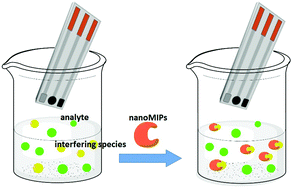NanoMIP-based approach for the suppression of interference signals in electrochemical sensors
Abstract
Herein, we describe the use of molecularly imprinted nanoparticles (nanoMIPs) as sequestering (masking) agents, to suppress the signal coming from interfering molecules and facilitate the detection of the target analyte. In this work, ascorbic acid was used as a model interfering molecule in dopamine electrochemical detection. NanoMIPs selective for ascorbic acid demonstrated to be capable of binding and suppressing electrochemical signal from ascorbic acid, enabling the detection of dopamine in the range 100–500 nM, without any need for sample pre-treatment. Tests in real samples (spiked human serum) were also carried out successfully. Due to the generic nature of the imprinting process, the proposed approach can be tailored to suppress potentially any interfering species, by simply varying the type of nanoMIPs used.



 Please wait while we load your content...
Please wait while we load your content...